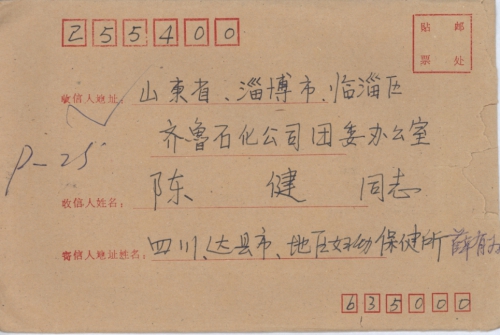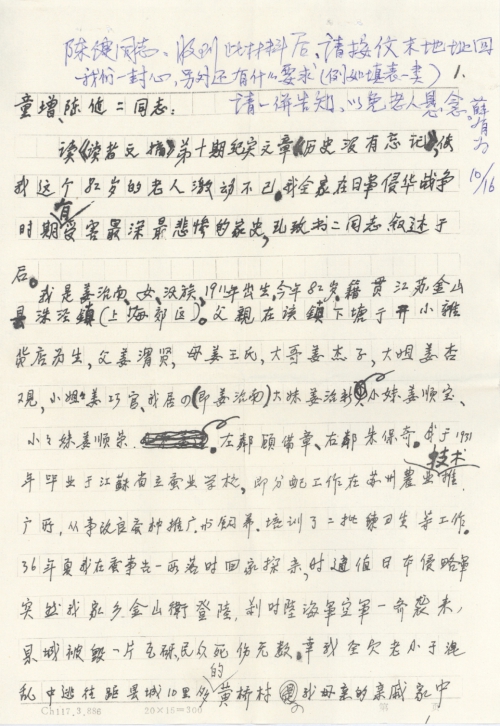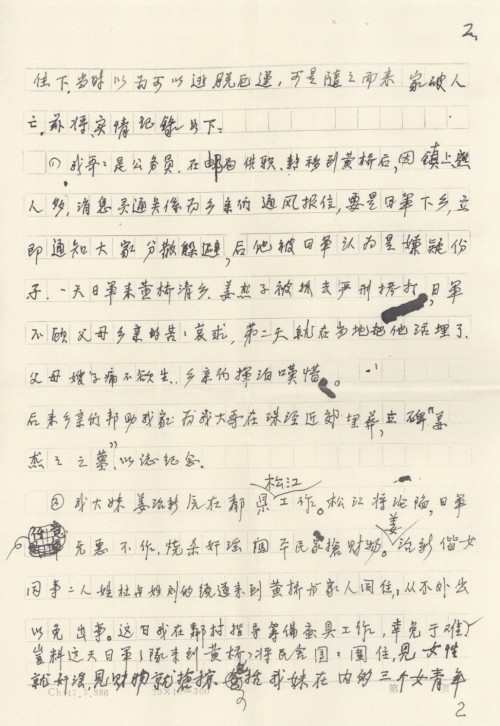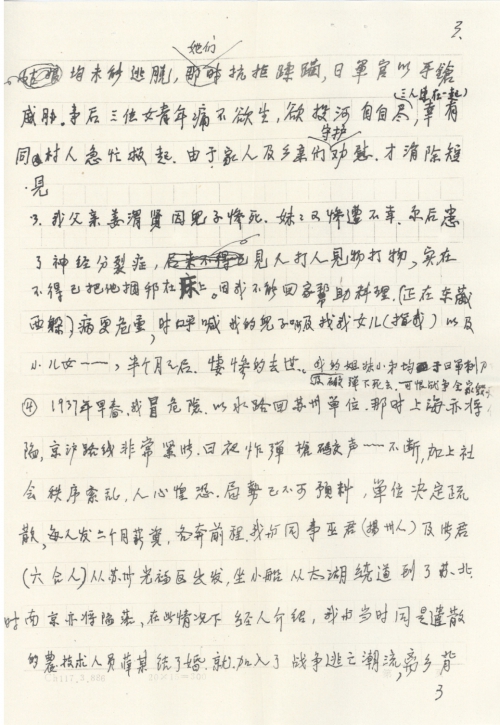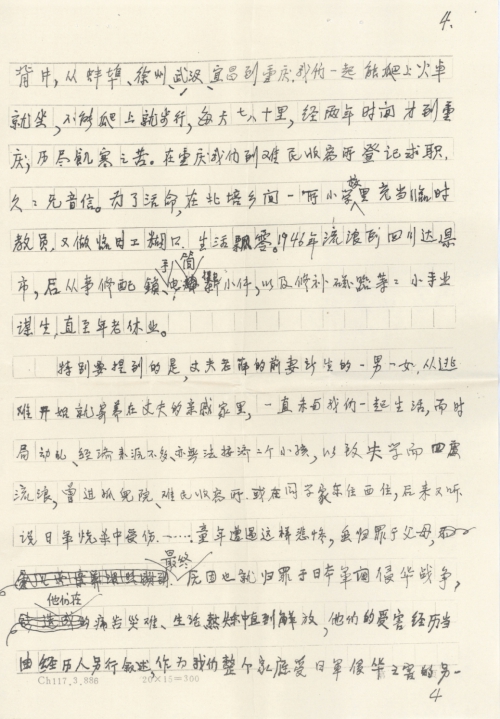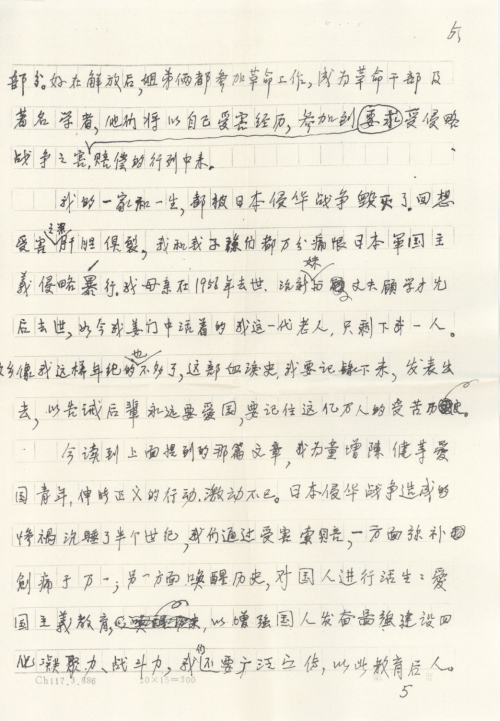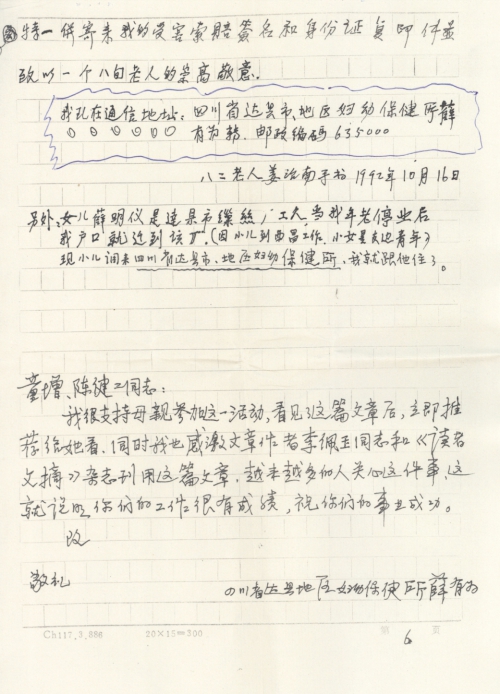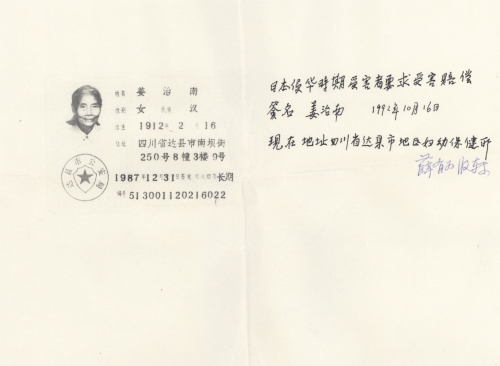Date of letter:1992-10-16
Address of author:Daxian City, Sichuan Province
Date of event:1936
Location of event:Daxian City, Sichuan Province
Name of author:Jiang Zhinan (Written by Xue Youwei, son of Jiang Zhinan)
Name(s) of victim(s):Jiang Jiezi(Jiang Zhinan’s brother)
Type of atrocity:Murders, Rapes, Others(MU, RA, OT)
Other details:In 1936 the Japanese Army landed at our place, and brought a disaster. They burned, killed and looted, raped women, and committed numerous crimes. My originally happy home was totally destroyed. It is the Japanese invasion that destroyed everything we have. The debt of blood must be repaid in blood; I demand Japan to compensate all our losses.
Comrade Tong Zeng, Chen Jian,
I, an 82-year-old woman, became quite emotional after reading the article entitled “History Is Not Forgotten” from Issue 10 of Reader’s Digest because my whole family suffered most during the Japanese army’s invasion of China. I am writing to tell you about our suffering.
I am Jiang Zhinan, female, Han, 82, born in 1911 in Zhujing Town, Jinshan County, Jiangsu (now suburb of Shanghai). My father ran a small grocery store in Xiatang Street, Zhujing Town. My father was Jiang Weixian, my mother Mrs. Jiang, older brother Jiang Jiezi, oldest sister Jiang Xingguan, second oldest sister Jiang Qiaoguan, I (the fourth child) Jiang Zhinan, my third youngest sister Jiang Zhixin, second youngest sister Jiang Shunbao and the youngest sister Jiang Shunrong, our left neighbor Gu Beizhang and right neighbor Zhu Baoqi. In 1931, I was assigned to work at Suzhou Agricultural Technology Promotion Institute after graduating from Jiangsu Provincial Sericulture School. My job was improving, promoting and feeding silkworm eggs and I also provided training to two groups of trainees. In the summer of 1936, I paid a visit home after my work was completed. Unexpectedly, the invading Japanese army landed at Jinshanwei in my hometown. Our county fell into ruin after being attacked by the Japanese air force, army and navy at the same time and countless people died or were injured. Luckily, my whole family had fled to Huangqiao Village over 10 li (1 li=500 meters) from the county and lived in one of my mother’s relatives’ house. We thought we had escaped the disaster, but my family was afterwards torn apart. The details are provided below:
① My older brother Jiang Jiezi was a civil servant at the Post Office and had many acquaintances in the town. After we moved to Huangqiao Village, my older brother would inform the villagers of hiding before the Japanese army came to the village by using his relationship network. Later, he was regarded by the Japanese army as a suspect. One day, the Japanese army came to Huangqiao Village and captured my older brother to cruelly punish and torture him. Although my parents and villagers sincerely begged for mercy, the Japanese army buried my older brother alive the next day in the village. My parents and older sister-in-law cried their hearts out; the villagers also shed tears.
Later, with the help of the villagers, my family buried my older brother in the suburb of Zhujing Town and erected a tombstone “Tomb of Jiang Jiezi” to commemorate him.
② My third youngest sister Jiang Zhixin originally worked in Songjiang, Lin County. After Songjiang fell, the Japanese army committed all kinds of crimes there including burning, killing, raping and robbing. So, she, along with 2 female colleagues surnamed Du and Liu respectively, made a detour to come to Huangqiao Village and live with the family. They never went out to avoid trouble. One day when I was preparing silkworm tools in a neighboring village, a group of Japanese soldiers came to Huangqiao Village and surrounded the houses to rape women and rob property. Three young women including my younger sister failed to escape. They tried to resist, but the Japanese soldiers threatened them with guns. After being raped, they were overwhelmed with grief and decided to kill themselves by tying them together and jumping into the river. Luckily, they were saved by other villagers and got rid of the thought of death thanks to the care and comfort of the family and villagers.
③ As my older brother died tragically and my younger sister was raped, my father Jiang Weixian suffered from schizophrenia. He would hit any person or object he saw. We had no choice but to tie him to the bed. As I was busy hiding from danger and couldn’t help take care of him at home, his disease became worse. He would unconsciously call the names of my older brother, me and my younger sister. Half a month later, he died a tragic death. Besides, my older sister and younger sister and brother were all bayoneted or bombed to death by the Japanese army. The war destroyed my family.
④ In early spring of 1937, I risked my life to return by waterway to my work organization in Suzhou. At that time, Shanghai was about to fall. The Beijing-Shanghai railway was filled with the sound of guns and bombs day and night. Due to a chaotic social order, terror and unpredictable war condition, my work organization decided to dismiss all employees by paying each of us a 2-month salary. So, I departed from Guangfu District, Suzhou with my colleagues Mr. Wu (from Yangzhou) and Mr. Zhang (from Liuhe) and detoured to northern Jiangsu from Lake Tai by boat. Back then, Nanjing was about to fall too. Then, someone introduced Xue XX, also a dismissed agricultural technician, to me and I married him. After marriage, we began a fugitive life. We left home for Bengbu, Xuzhou, Wuhan, Yichang and Chongqing. We would take a train if we could, or walk 70 or 80 li (1 li = 500 meters) every day on foot. It took us two years to reach Chongqing after suffering from hunger and cold. Then, we registered at the Refugee Camp to look for a job, but didn’t receive any reply for a long time. So, to make a living, we found a job as a temporary teacher at a school in the countryside of Beibei and also did a part-time job as a casual laborer. In 1946, we came to Da County, Sichuan Province, where we made a living by repairing locks, flashlights and equipment, etc. until retirement due to old age.
What’s worth mentioning is that my husband’s son and daughter, given birth by his ex-wife, had lived with one of my husband’s relatives since we fled from home as refugees. They never lived with us and we couldn’t give money to them as we didn’t have much of money in the war time. So, they had to leave school to live a vagrant life. They lived in orphanages, or refugee camps, or their classmates’ houses. Although parents are to blame for their tragic childhood, the fundamental cause is Japan’s war of aggression against China. Luckily, their suffering ended at the time of the People’s Liberation. They shall describe their suffering caused by the invading Japanese army personally as a part of the whole family. After the People’s Liberation, both of them joined the revolutionary work and later become a revolutionary cadre and a well-known scholar respectively. They will participate in the campaign of demanding damage compensation with their own suffering experiences.
My family and my life are ruined by Japan’s war of aggression against China. It breaks my heart every time I recall memories of the suffering. My offspring and I hate the atrocities of Japanese imperialist invaders to the core. My mother passed away in 1956, followed by my third youngest sister Zhixin and her husband Gu Xuecai. Now, I am the only old person alive in my family. There are not many people of my age in my hometown. I must record the tragic history and publish it to educate the future generation to always love the country and remember the history when millions of people suffered.
Today, I got quite emotional after reading the article mentioned above and learning that patriotic young men including Tong Zeng and Chen Jian are pursuing justice for Chinese victims. As the tragedies caused by Japan’s war of aggression against China have been kept silent for half a century, the compensation campaign can not only slightly relieve our trauma, but educate the people and future generations about patriotism to enhance their cohesion and encourage them to work hard in the cause of the Four Modernizations. We also need to promote this widely to educate the future generations.
Attached is my signature for damage compensation and a copy of my identity card. As an 82-year-old woman, I sent you my highest regards.
Address: Jiang Zhinan care of Xue Youwei, Maternity and Child Health Care Center, Da County, Sichuan Province. Postal code: 635000
82-year-old woman Jiang Zhinan
October 16, 1992
P.S. My daughter Xue Mingyi is a worker at the filature of Da County, so I registered my household with the factory after my retirement due to old age. (At that time, my son worked in Xichang and my youngest daughter worked at a border area)
Now I live with my son as he has been transferred to Maternity and Child Health Care Center, Da County, Sichuan Province.
Comrade Tong Zeng, Chen Jian,
I fully support my mother to participate in your campaign. After reading the article, I immediately recommended it to her. Also, I want to thank the author Li Peiyu and the magazine Reader’s Digest for publishing the article. Now more and more people are paying attention to this matter, which shows you’ve made quite an achievement. Wish you success.
Best regards,
Xue Youwei, Maternity and Child Health Care Center, Da County, Sichuan Province
Victim of Japan’s invasion of China demanding compensation
Signature: Jiang Zhinan, October 16, 1992
Address: Jiang Zhinan care of Xue Youwei, Maternity and Child Health Care Center, Da County, Sichuan Province
Comrade Chen Jian,
After receiving this letter, please send me a letter to the address indicated above and tell me the requirements (such as filling in the form) so that my mother won’t worry about it.
Xue Youwei
October 16















